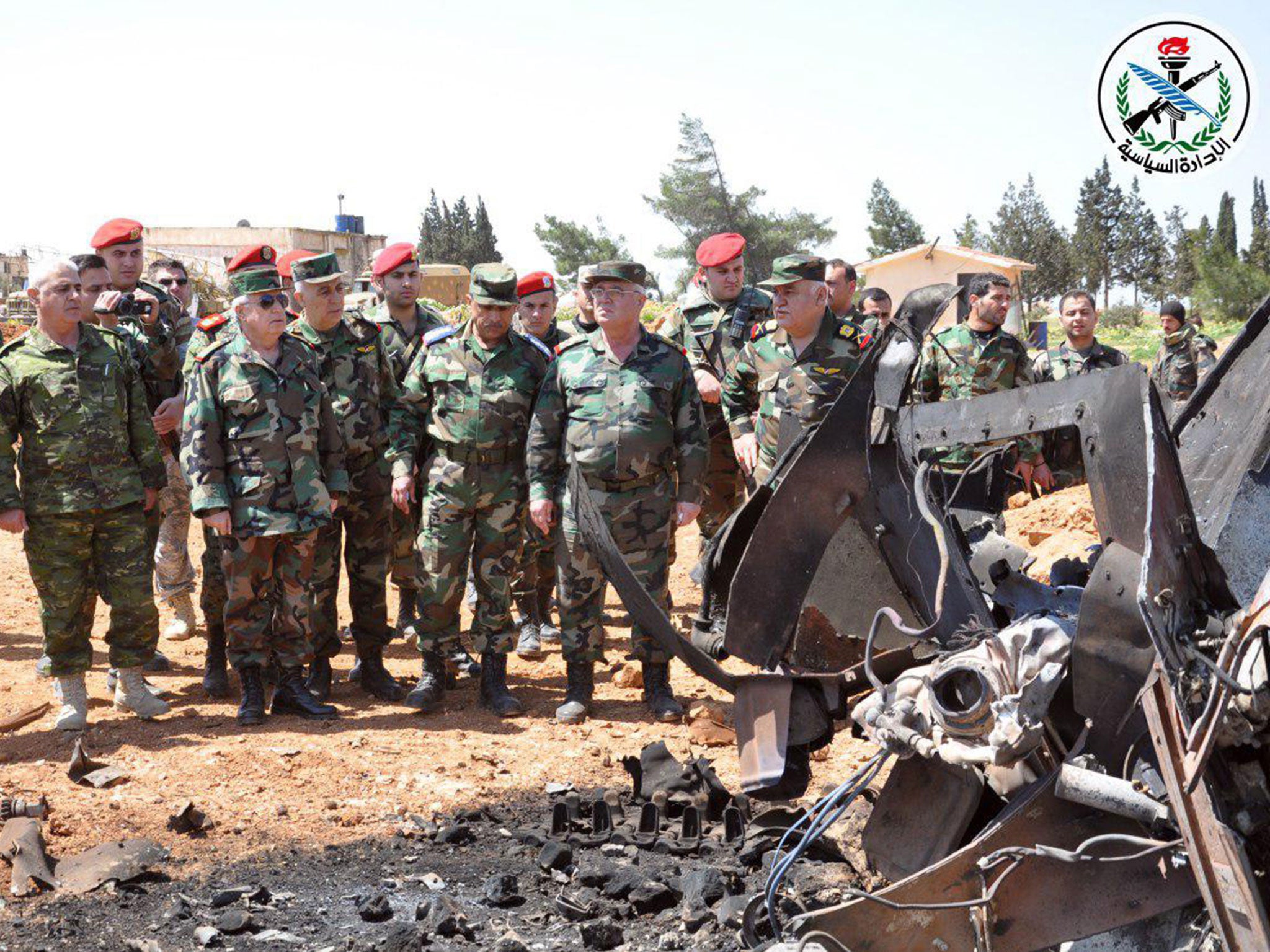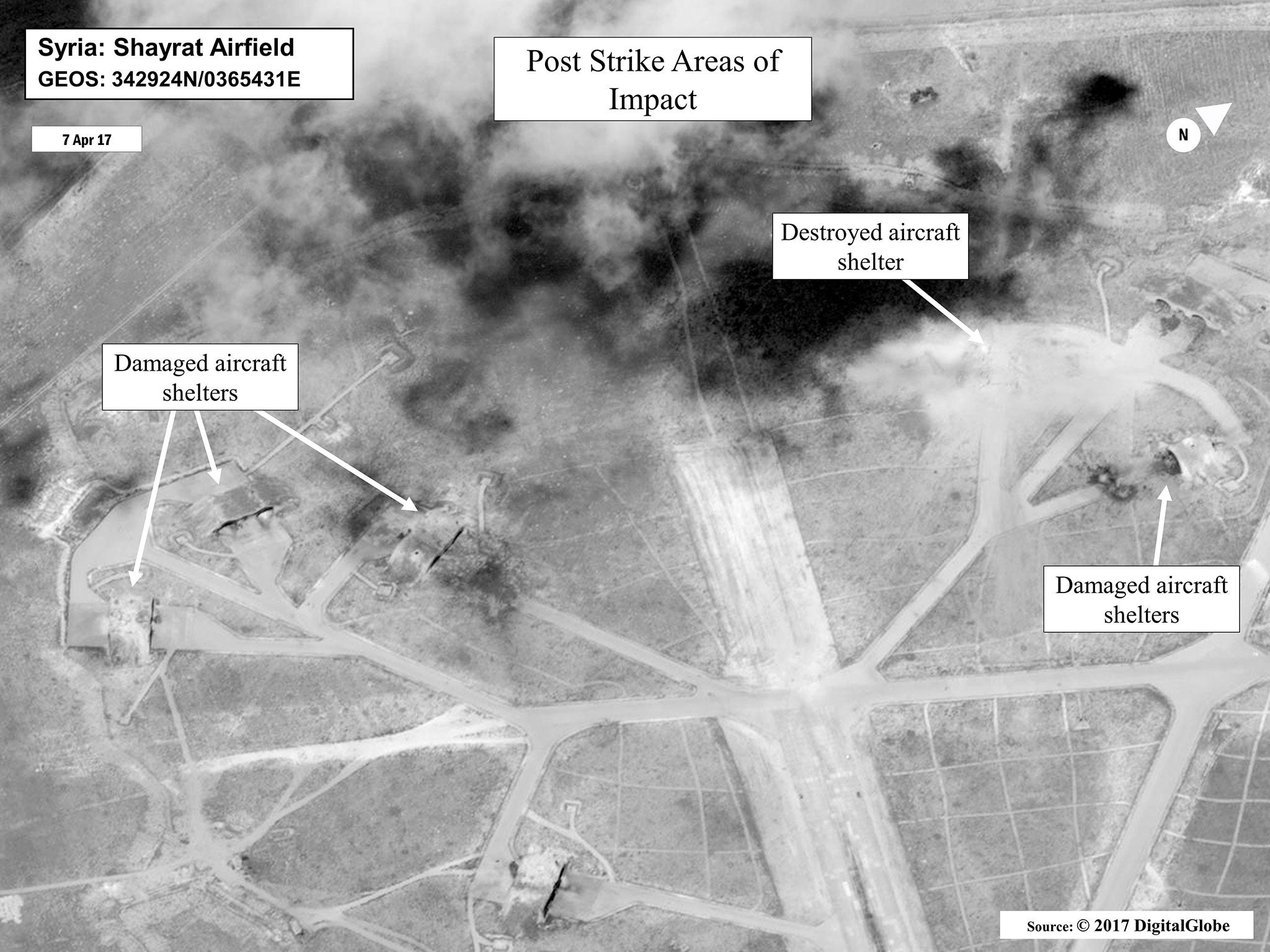Donald Trump’s Syria air strikes will not reduce Assad’s military capability, experts say
Footage claims to show fighter jets taking off from Shayrat airbase hours after bombardment
Donald Trump’s decision to bomb a Syrian airbase – alleged to be the source of a devastating chemical attack – has not significantly affected the regime’s capabilities. Supporters of Bashar al-Assad claimed fighter jets took off from Shayrat just hours after it was pummelled by a volley of 59 cruise missiles fired from US warships.
The Pentagon claimed around 20 aircraft were destroyed, along with missile systems, hangars and infrastructure, but Russia alleged that under half the missiles had made their target and only six planes were hit.
“Initial indications are that this strike has severely damaged or destroyed Syrian aircraft and support infrastructure and equipment at Shayrat airfield, reducing the Syrian government’s ability to deliver chemical weapons,” Capt Jeff Davis said. But hours after the air strikes hit, videos emerged claiming to show Su-22 fighter jets taking off from the base.
The UK-based Syrian Observatory of Human Rights said they headed towards eastern Homs province for missions against Isis, calling it a “morale response” to the US strike.
A Syrian journalist, Alaa Ebrahim, told CNN the first plane did not launch strikes and said the move was intended as a “symbolic gesture that the airbase is still operational”.
Footage claiming to show the planes could not be independently verified, but a man filming one take-off could be heard giving the date as 7 April.
As well as Shayrat, Assad’s air force operates from more around 20 other bases and has launched numerous strikes on opposition-held areas across Syria since the US attack, including using incendiary weapons. Regime planes have continued bombing Khan Sheikhoun, where more than 80 people died in a suspected chemical attack, killing at least one woman on Saturday according to activists.
Lina Khatib, head of the Middle East and North Africa programme at Chatham House, said the bombardment of Shayrat airbase had “not significantly affected the regime's military capability.
“The regime might now think twice before using chemical weapons, but it has not stopped using conventional weapons,” she told The Independent.
“The strikes also happened after the US had given ample warning to Russia about them, which allowed the Syrian army to evacuate the airbase and minimise causalities.”
Col Hassan Hamade, a Syrian pilot who defected by landing his MiG-21 in Jordan in 2012, agreed, saying that tarmac could be fixed within hours and any affected communications or control systems within weeks or months.
“The bombardment of Shayrat will not have a major effect on military operations of the regime,” he added.
State television showed the Syrian army’s chief of staff, General Ali Abdullah Ayyoub, touring the facility on Friday, meeting pilots and men injured in the American bombing, which killed at least six Syrian troops. Footage showed one plane still standing inside a shelter, amid destroyed jets and hangars on runways pockmarked with craters and blackened metal. Amid the wreckage were scattered containers for cluster bombs, which are illegal in more than 100 countries because of the indiscriminate destruction they cause.
Mr Trump’s national security adviser, Herbert “HR” McMaster, claimed a sarin gas store at the base was avoided during the attack, which aimed to reduce the airfield’s ability to “continue mass murder attacks against Syrian civilians”.

Assad’s forces have denied using chemical weapons and said the “US aggression” only strengthened its “dogged determination to continue its national duty of defending the Syrian people and beating terrorism”, a term used to describe all armed opposition groups.
Vladimir Putin’s defence ministry reaffirmed its support for Assad and vowed to bolster air defences for the Syrian regime, sending a new warship armed with cruise missiles to the Syrian coast.
Shayrat airbase, situated in the central province of Homs, has been crucial in campaigns against Isis in Palmyra and Deir Ezzor launched by Assad’s forces and Russia, as well as attacks on opposition rebels.
Rex Tillerson, the US Secretary of State, described it as “the facility that delivered” the suspected chemical attack on Khan Sheikhoun on Monday.
It is the second-most active regime airfield in Syria, behind the Russia-operated Khmeimim airbase in Latakia. The third-most active base, Saqqal in central Syria, is expected to be used to fill any vacuum created by the destruction at Shayrat.
American officials said all but one of the 59 missiles launched by two US warships struck their targets, hitting multiple aircraft and air shelters and destroying the fuel area, while Syrian state media claimed rogue missiles hit nearby villages and killed several civilians.

Britain and other US allies welcomed Mr Trump’s response to what he called a “barbaric” chemical attack, but the reaction in Syria was mixed. Critics pointed out that the President’s sudden concern for the country’s civilians came after years of vocal opposition to intervention and ambivalent statements on Assad, while at the same time he has attempted to ban Syrian refugees from entering the US.
The regime and its supporters were outraged by what they called a “violation of international law” and said the action would strengthen Islamist rebel groups. Others were jubilant, with one man reportedly vowing to name his son after Mr Trump amid hopes that the strike could represent a turning point against Assad.
Other Syrians in opposition-held areas were more wary, questioning why Monday’s attack had provoked an international response when a much larger sarin attack in 2013 and the deaths of thousands of civilians in conventional bombing had not. In Khan Sheikhoun, residents living under fresh bombardment gave the US strikes a cautious welcome.
“Everyone is waiting to see what will come next,” a woman told The Independent. “It is not clear what it means. What will happen now?”
Join our commenting forum
Join thought-provoking conversations, follow other Independent readers and see their replies
Comments
Bookmark popover
Removed from bookmarks